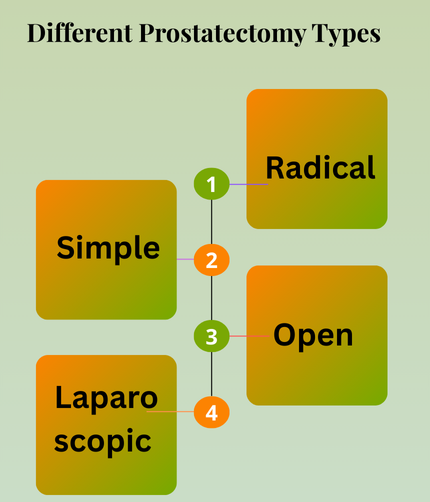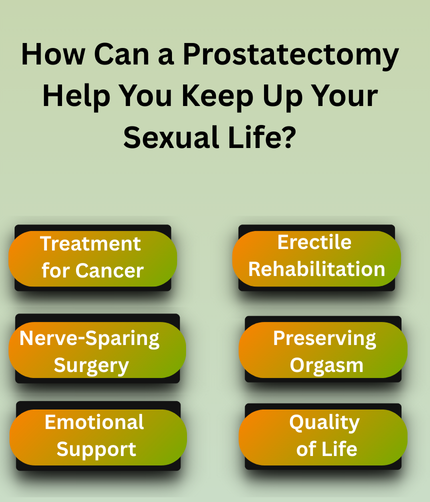Introduction:
This involves removing the prostate gland whole or in part. It’s beneath the bladder in the pelvis.
The prostate is located extremely near to the nerves that regulate erections.
Erectile dysfunction may result from injury or removal of these nerves after a prostatectomy, particularly a radical prostatectomy, which can cause either temporary or chronic problems.
Many men can, however, eventually restore their erectile function, especially if nerve-sparing procedures are employed after surgery.
The surgeon’s expertise, age, and erectile function before surgery all have a big impact on recovery.
Men who are younger and had a powerful erection before surgery had a higher chance of regaining function. The healing process might take a few months, a year, or longer.
What Is Prostatectomy?
Cancer patients may benefit from it, but the hazards and impact on quality of life must be carefully considered.
This procedure is most frequently used to treat severe instances of benign prostatic hyperplasia, or an enlarged prostate, and prostate cancer.
This is often done to alleviate BPH-related urinary problems and involves removing only a portion of the prostate.
While recovery duration varies, it usually entails a few weeks of rest and minimal exercise. For a brief time during the early stages of recuperation, patients might also require a catheter to aid with urinating.
Particularly in instances of radical prostatectomy, ED and urinary incontinence are frequent side effects. These consequences can be either short-term or, in certain situations, long-term, contingent on nerve injury and other variables.
Can a man’s ability to have an erection be affected after a prostatectomy?
Having a prostatectomy might have an impact on a man’s erection. The prostate gland may be removed entirely or in part during this operation, which might harm the nerves that regulate erections. Because of their proximity to the prostate, these nerves might be challenging to maintain fully.
This can range from short-term trouble to long-term loss of erectile function, depending on several variables, including age, health, and the kind of surgery done.
This is a procedure that surgeons may employ to prevent harming the erection-causing nerves.
If both nerve bundles are intact and the cancer hasn’t migrated to neighbouring tissue, this method improves the likelihood of restoring erectile function.
Recuperation requires patience and continuous attention from medical professionals.
Several therapies are available to help with erections following a prostatectomy, including penile implants, vacuum erection devices, penile injections, and oral drugs like Cialis or Viagra. During rehabilitation, these therapies can promote sexual activity and increase blood flow.
Pre-surgery sexual health, younger age, and nerve-sparing procedures all increase the likelihood of recovery.
What Is The Purpose Of A Prostatectomy?
When prostate cancer strikes, the whole prostate gland and some surrounding tissue are removed during a radical prostatectomy. To stop the cancer from spreading to other organs, it must be removed from the body.
By doing this, the enlarged portion of the prostate that is obstructing urine flow may be removed. This lessens the symptoms of urine retention, frequent urination, and trouble peeing.
The alleviation of severe symptoms or consequences that have not improved with medicine or other therapies may be another goal. These include infections that keep coming back, renal problems brought on by prostate problems, or damage to the bladder.
Additionally, this can assist in enhancing quality of life by lowering pain or discomfort associated with prostate disorders and restoring normal urine function.
Prostate disease may be treated surgically, complications can be avoided, and the patient’s general health and well-being can be enhanced.
Different Prostatectomy Types
Each form of this is intended to address a particular problem affecting the prostate. The primary distinctions are in the extent of prostate excision and the surgical technique.

- Radical Prostatectomy
Most frequently, this is treated with it. Open, laparoscopic, and robot-assisted surgery are some of the several methods used for this procedure.
- Simple Prostatectomy
Not malignancy, but benign prostatic hyperplasia (BPH) is mostly treated with it.
- Open Prostatectomy
To reach the prostate, a bigger incision is made in the lower abdomen using this conventional surgical technique. It provides direct access to big or complex prostates, but it is more invasive and typically requires a longer recovery period.
- Laparoscopic Prostatectomy
Small incisions and a camera are used to guide the procedure in this minimally invasive technique. It typically leads to a speedier recovery, shorter hospital stays, and less discomfort than open surgery.
After a prostatectomy, what part do nerves play in erectile function?
The neurovascular bundles are sensitive nerves that run across the prostate and regulate erectile function. These nerves cause an erection by transmitting signals from the brain to the penis.
Particularly when treating cancer, these nerves may be damaged or removed during a prostatectomy.
A nerve-sparing procedure may be performed by surgeons to assist in maintaining sexual function. This method is cautious not to harm the erection-causing nerves.
Whether this is feasible, however, depends on the cancer’s location and development; in certain cases, nerve excision is required to guarantee that all malignant tissue is removed.
Nerves may be injured or impacted during surgery, even if they are not damaged. To reestablish sexual function at this time, blood flow restoration and nerve mending are essential.
Recovery is more likely for younger men and those who had strong erectile function before surgery. To promote the healing of nerves and blood vessels, rehabilitation techniques such as medicine, vacuum equipment, or even penile injections may be suggested.
What Is The Duration Of The Erection Recovery?
Each person’s recovery time for erections following a prostatectomy might differ significantly. Although this usually starts to improve in 3 to 12 months, some men may not notice any noticeable change for up to 2 years.
- Nerve-sparing surgery
- Age
- Pre-surgery erectile health
- Overall health
Male patients who have nerve-sparing surgery typically recover more quickly and fully.
Doctors may advise erectile rehabilitation during the recuperation phase, which may involve pills, vacuums, or penile injections. These treatments support the preservation of blood flow and promote nerve and blood vessel recovery.
In conclusion, a complete recovery for many men may take 1-2 years; however, other guys regain erections in a matter of months. The optimal result can only be achieved with persistent therapy, medical support, and patience.
Sexual Issues and Prostatectomy
Male patients who are having a prostatectomy frequently worry about sexual problems, particularly if the procedure is being done to treat prostate cancer.
An inability to obtain or sustain an erection may result from injury or removal of these nerves after surgery, particularly a radical prostatectomy. Males who have erectile dysfunction may also lose their ability to ejaculate. Semen is no longer produced by the body since the operation removes the prostate and seminal vesicles.
Additionally, following surgery, some men report having less libido or sex drive. Psychological stress, hormonal changes, or adverse reactions to other cancer therapies, such as hormone therapy, can all contribute to this. Weariness and changes in body image might also be factors.
There may also be relational and emotional difficulties. Problems with sex can impact intimacy and self-worth. Counselling and open conversation with a spouse can assist couples in coping with these changes.
Despite these problems, many men may use drugs, technologies, or therapy to have a fulfilling sexual life again following a prostatectomy. To manage expectations and investigate treatment possibilities, healthcare practitioners’ assistance is crucial because recovery takes time.
How Long After Surgery Does It Take To Get An Erection Again?
The recovery period for erections following a prostatectomy varies greatly from person to person. The majority of men typically have erectile function symptoms three to twelve months following surgery. However, several important circumstances might cause a full recovery to take up to two years or more.
Regaining function and maybe speeding up recovery are far more likely if a nerve-sparing treatment is employed and the erection-related nerves are spared. Recovery is typically quicker for younger, healthy men who had powerful erections before surgery.
Some men may have a delayed restoration of erections and insufficient strength to engage in sexual activity without help.
It is also typical to have short-term erectile dysfunction just after surgery, even if nerve-sparing techniques are used.
Erectile rehabilitation is frequently advised by doctors to begin shortly after surgery in order to preserve tissue health and enhance long-term results. This can have a big impact on how fast and completely a man heals.
While some men recover their erections in a few months, many require 6-24 months, with recovery outcomes varying according to surgical method, individual health, and post-surgery care.
Can I Get An Erection After Having A Prostatectomy?
You can increase your chances of restoring erectile function by talking to your doctor about recovery alternatives.
It may take a few months for some men to regain their erections following surgery, but it may take a year or more for others.
- Possibility of Erections
Following a prostatectomy, the likelihood of recovering erections is primarily dependent on the type of surgery performed and whether nerve-sparing procedures were employed. Although there are still ways to enhance performance, erectile dysfunction is more probable if these nerves are injured or destroyed.
Recovery after nerve-sparing surgery might vary based on several factors, including age, erectile function before surgery, and general physical condition. While some men may be able to regain their erections on their own, others may require the use of gadgets, penile injections, or drugs.
- Post-Surgery
These therapies can enhance long-term results and hasten healing. It’s critical to see a doctor for routine follow-up to evaluate progress and resolve any concerns.
Because changes in sexual function can affect relationships and self-esteem, emotional support is also critically important throughout rehabilitation.
Addressing psychological issues can be facilitated by open dialogue with partners and, if required, counselling. When given the proper care and support, many men may restore a fulfilling quality of life after surgery, even if recovery takes time.
Until normal bladder control is restored, a temporary catheter placement may be necessary to help with urinating.
- Psychological Factors
Depression, anxiety, and low self-esteem might result from changes in sexual activity or erectile dysfunction. These feelings are typical since males may have anxiety or a lack of confidence over their intimacy with a partner.
Performance anxiety can be brought on by the worry of sexual dysfunction, which makes rehabilitation much more difficult. Relationship, masculinity, and sexual identity-related worries might exacerbate stress and postpone recovery.
Relationships, family, and professional counsellors can all provide support in reducing emotional pain. Therapy or support groups are beneficial for many guys since they allow them to discuss their experiences and acquire coping mechanisms.
Couples who want to improve their relationship and manage changes in intimacy might also benefit from counselling or sexual therapy.
- Erectile Function
Many men can, however, regain some degree of erectile function, particularly if a nerve-sparing prostatectomy is carried out. The neurovascular bundles that regulate erections are attempted to be preserved by the surgeon during nerve-sparing surgery.
Although the likelihood of recovery is increased, it may still take months or even years to fully recover. Temporary erectile dysfunction may affect some men, while medical intervention may be necessary for others.
Erectile dysfunction’s psychological effects may also have an impact on recovery. Regaining sexual function might be hampered by stress, worry, and sadness.
Support from spouses, therapists, and medical professionals can help address emotional issues and enhance the results of rehabilitation.
Many men regain some degree of erectile function with time and medication, even though erectile function may be compromised following a prostatectomy. Some variables, such as the type of surgery, nerve preservation, and post-surgical care, affect the healing phase.
Can a Prostatectomy Assist With Vacuum Erection Devices?
After prostate surgery, men who develop erectile dysfunction may find this gadget very helpful.
Many men feel that the VED is useful in establishing a functioning erection, even though a prostatectomy, especially a severe one, might impair the nerves responsible for erections.
To mechanically induce an erection, the vacuum device creates a vacuum surrounding the penis, which attracts blood to it. To keep the erection going after it has been obtained, a constriction band is positioned at the base of the penis.
A thorough rehabilitation approach may include a VED in addition to other therapies like penile injections or oral drugs (like Sildenafil). In the early phases of recovery, when the body’s natural erectile function may still be regaining its strength or may not have entirely recovered, it is particularly helpful.
One useful tool for guys recuperating from a prostatectomy is a vacuum erection device. It offers a mechanical way to get an erection and can be utilised as a component of a more comprehensive plan to treat erectile dysfunction following surgery.
What Is Your Sexual Experience Like After Prostate Surgery?
Regaining full function, if any, might take months or even years in certain situations. The recovery period for erectile function can also vary.
Following a radical prostatectomy, the prostate and seminal vesicles are removed, which prevents males from ejaculating during orgasm.
It is crucial to understand that a decline in sexual desire is normal and does not always last.
Sexual relationships can be impacted by performance worries, intimacy issues, and shifts in self-esteem. Counselling and candid dialogue with a spouse might help handle these difficulties.
These therapies can help men restore confidence in their sexual encounters and help them achieve erections.
Although sexual closeness may evolve, many couples adjust by discovering new means of emotional and physical connection. As they adapt to the changes, couples may discover new methods to show closeness and affection, and partners frequently play a supporting role.
Following prostate surgery, men may have varying sexual experiences; nevertheless, with the correct care, encouragement, and adaptations, many men eventually regain their sexual satisfaction.
Each person’s path is unique, so it’s critical to exercise patience and collaborate with medical professionals to identify the best options for sexual health.
How Can a Prostatectomy Help You Keep Up Your Sexual Life?
The type of surgery, the patient’s health, and the post-surgical treatment can all influence how this can preserve or enhance sexual life. Despite the potential impact on sexual function, prostate surgery can nonetheless help maintain closeness and sexual health in the following ways:

- Treatment for Cancer
A prostatectomy is a successful way to remove malignant tissue from the prostate, which lowers the chance that the disease will spread. You may be able to live a longer and better life after the surgery to treat the cancer, which may allow you to have satisfying sex.
Even if recovery from the operation could take some time, you can eventually maintain closeness with the assistance of survival and health gains.
- Erectile Rehabilitation
By sucking blood into the region and producing a vacuum around the penis, a vacuum erection device is a non-invasive method of helping men get an erection.
To help sustain the erection, a constriction ring is positioned at the base of the penis once it has been obtained. This tool is frequently used to support blood flow and tissue health in the early phases of rehabilitation.
After prostate surgery, it may take months or even years to restore erectile function due to the progressive nature of rehabilitation.
The likelihood that erectile function will be preserved or improved increases with the timing of erectile rehabilitation. Even if men do not have erectile dysfunction right away after surgery, they are advised to start therapy as soon as feasible.
- Nerve-Sparing Surgery
During a radical prostatectomy, a specialist procedure known as “nerve-sparing surgery” is employed to assist in protecting the neurovascular bundles, which are the fragile blood arteries and nerves that are in charge of erectile function.
The achievement and maintenance of an erection depend on these neurones, which run parallel to the prostate. Since the tumour is contained and the nerves remain unaffected, surgeons may try to save one or both nerve bundles during the procedure.
The location and stage of the malignancy, the surgeon’s skill level, and the patient’s general health all affect how well nerve-sparing works. In order to guarantee that all malignant tissue is removed, the surgeon may decide to remove the nerves if doing so would put the malignancy at risk of remaining.
This seeks to maintain sexual function while providing effective cancer therapy.
- Preserving Orgasm
Even though this frequently impairs a man’s erection and ejaculatory abilities, orgasms can still occur following surgery. The experience and feeling, nevertheless, can be different from what they were previously.
Regardless of whether they have a complete erection or not, men with this condition can still have orgasms through stimulation.
Having fun with sex after surgery also requires being emotionally prepared, communicating openly with a partner, and adjusting to the new feeling.
Some men report that their orgasms are shorter or less strong than they used to be, and some may first feel uncomfortable, like a tingling or tugging sensation. Over time, these effects often become better.
Even in the absence of ejaculation, orgasm is still achievable, albeit some aspects of sexual function are altered. A satisfying sexual life may be maintained by many men with time, support, and occasionally sexual treatment.
- Emotional Support
Recovery from a prostatectomy requires emotional assistance, particularly when adjusting to changes in body image, sexual function, and general quality of life. Emotional difficulties following surgery may include worry, depression, annoyance, or a loss of confidence, especially if erectile dysfunction or urinary problems arise.
It may be quite beneficial to have a support network, which might include a spouse, family, friends, or medical professionals. During recovery, open conversation about expectations, emotional needs, and worries with a partner keeps the relationship strong and fosters closeness.
It is beneficial for many guys to talk to a support group, therapist, or counsellor. These services provide a secure setting for discussing feelings, assisting with life transitions, and learning from others’ experiences with comparable difficulties. To share their experiences and get support, some men find solace in attending support groups for men’s health or prostate cancer.
Physical treatment is crucial, but so is mental health assistance. Stress may be decreased, mood can be lifted, and a healthy recovery can be supported by attending to emotional well-being. This might therefore increase sexual confidence and facilitate acclimatisation to changes in closeness.
- Quality of Life
After a prostatectomy, quality of life can be extremely excellent, especially if the operation is effective in removing prostate cancer or in relieving severe symptoms of disorders like BPH.
Although the healing process involves both physical and emotional modifications, many men resume their regular activities, jobs, and relationships.
During the first several months following surgery, erectile dysfunction, tiredness, and urine incontinence are common problems.
Nonetheless, most men see notable improvements over time with the right medical attention. Medication, erectile rehabilitation, pelvic floor therapy, and other treatments can all significantly aid in the healing process and function restoration.
In addition to physical health, mental and emotional health are important aspects of quality of life. It can be challenging to deal with changes in one’s sexual health or body image, but men can maintain their confidence and optimism with the aid of their partners, counsellors, or support groups.
Crucially, following treatment, many men have a sense of relief and a renewed emphasis on their health, particularly in cases when cancer is effectively eradicated.
Better nutrition, exercise, and stress management are just a few examples of lifestyle changes that can result from this, further improving quality of life.
If I undergo a prostatectomy, can I still have an orgasm?
Indeed, you may still have an orgasm following a prostatectomy, although it might not be the same as it was before the procedure.
Because the prostate gland and seminal vesicles are destroyed following a radical prostatectomy, you will no longer ejaculate semen during an orgasm. The term “dry” orgasm is frequently used to describe this.
Because the brain, nerves, and vaginal area—the elements of the body responsible for sexual pleasure—remain intact, you can still experience the joy and sensation of an orgasm even if you lose the capacity to ejaculate.
Although the sensation may be less powerful or feel different in the absence of semen discharge, many men nonetheless report having an orgasmic experience.
It’s also crucial to remember that this might happen following surgery, which may impair your capacity to get an erection and experience an orgasm.
However, many men can restore the capacity to achieve an erection and experience an orgasm with the right therapy, such as drugs, penile injections, or vacuum devices.
Although sexual happiness varies, you may rediscover closeness and pleasure with the aid of therapies and support.
After Having a Prostatectomy, Can Men Still Have Fulfilling Sexual Lives?
Even though their sexual lives may not be the same as they were before surgery, many men may nevertheless lead satisfying sexual lives following a prostatectomy. This, particularly a radical prostatectomy, can impact sexual function, such as ejaculation and erections, but it does not take away the capacity for intimacy, pleasure, or orgasm.
Recuperation might take months or even two years. Men tend to adjust well if they continue their erectile rehabilitation and have open communication with their spouses.
Sex therapy, support groups, and counselling can all help couples maintain their confidence and connection while addressing emotional effects.
When given the proper care, support, and an optimistic, accepting attitude towards change, many men go on to lead fulfilling, intimate sexual lives.
Do not assume that your partner will understand; instead, communicate your current feelings to them. As simple as it may sound, people should be aware of their sexual thoughts and aspirations when they deserve to know.
It is easy to have orgasms even if you are unable to reach the ejaculatory stage, as seen above. Take advantage of sexual acts that you both love, such as oral sex, kissing, and caressing.
Feel free to speak with a sex therapist if nothing appears to help. Please visit our Medypharmacy websites.
























